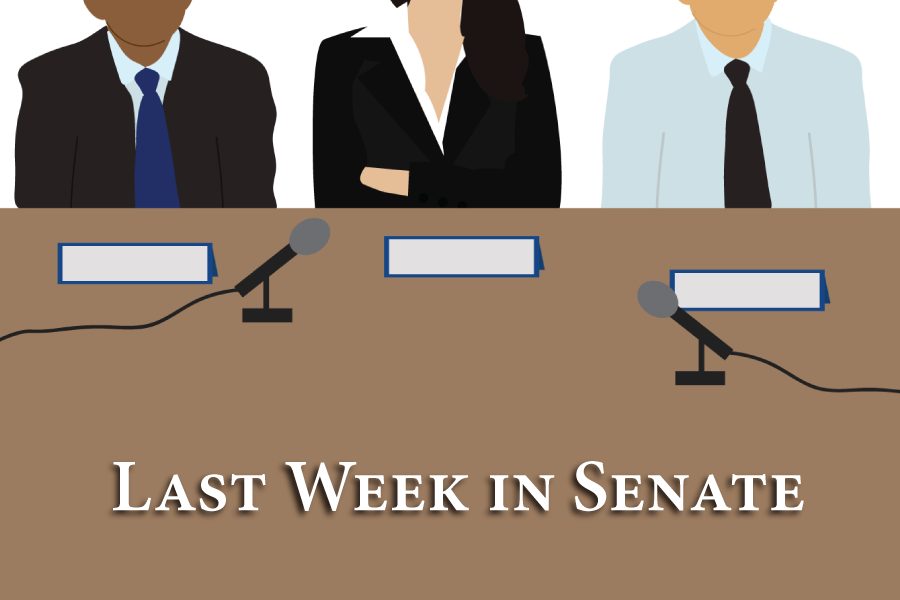
The ASUCD weekly Senate meeting took place on March 2 in the Mee Room of the Memorial Union. During quorum roll call, interim Senator Michael Chan was absent; however, he arrived later during the meeting.
Senator Daniel Nagey spoke about a constructed survey by the joint ASUCD-GSA Housing Task-force to be sent out to all UC Davis students, faculty and staff suffering from housing issues. He urged members of the Senate to take a few minutes to fill out the survey. Next, he introduced Donald Gibson, the co-chair of the Task-force, who had prepared a presentation about the importance of the data collected by the survey.
Gibson’s presentation addressed the projected increase in enrollment of students in conjunction with the stagnating population of Davis. He emphasized that the fundamental issue with housing units is the lack of supply.
Next, Senator Sofia Molodanof presented about the campaign “spread the word to end the word” regarding the use of the word “retarded” in addressing people with disabilities. She discussed how ASUCD has not addressed this issue and encouraged others to pledge to address people with disabilities as the human beings that they are rather than letting their disabilities define them.
ASUCD Entertainment Council Director Rachel Meyers presented on the unit’s past, current and future plans for events. She discussed plans for athletics partnerships for unconventional venues, implementing a sponsorship deck in order to generate revenue and a new video series to provide an additional platform for student performers. Furthermore, she discussed the unit’s income, with consideration of a possible discrepancy as a result of not receiving all of the funds the unit was owed from the Chance the Rapper concert.
Internal Affairs Commission (IAC) chair Nick Flores questioned the preparedness of Entertainment Council in future situations similar to the Chance the Rapper “Facebook incident” and Meyers responded that it has given them insight on how to tackle similar issues in the future.
Senate Resolution #49, authored by Senator Sam Chiang, was amended after meeting with campus legal counsel. This resolution condemns Interim Chancellor Ralph J. Hexter for allowing Milo Yiannopoulos, a far-right speaker, to visit UC Davis.
Molodanof believes that Hexter could not legally condemn Yiannopoulos because he is at the helm of a public university. Senator Anastasia Ruttkay mentioned that Hexter’s expression of disappointment showed his point of view on the issue, and Nagey stated that the chancellor could have sent out an email to notify and provide safe spaces for students who would be suffering as a result of the event taking place, but he did not do so.
Senator Jose Meneses discussed how Club Finance Council would have funded the event, regardless of the whether the full controversial name of Yiannopoulos’s tour, titled “The Dangerous Faggot Tour,” was included, because funding for club events is not politicized.
Gender and Sexuality Commission chair Alison Tam had spoken with Vice Chancellor of Student Affairs Adela de la Torre and said that “[the administration was] aware of the steps they could have taken and chose not to do anything.” Former senator and future ASUCD President Josh Dalavai suggested putting limits on controversial speakers and their interaction with the crowd so that individual students do not get targeted. Ethnic and Cultural Affairs Commission Chair Julienne Correa urged ASUCD to apologize to all communities affected by the Yiannopoulos visit, mentioning that often times “we are reactive rather than proactive.”
After facing an objection from Chan, who believed that the legislation was not explicit enough, SR #49 passed with 10-0-2.
For Senate Bill #52, the Sexual Assault Awareness and Advocacy Committee (SAAAC) Chair Rachelle Fishbin asked to change the SAAAC job descriptions to more accurately reflect the job responsibilities. The bill passed.
In response to the SAAAC effort, ASUCD Controller Joe DeAngelo composed a bill in order to make it easier for the SAAAC to receive money for its committee endeavors.
Campus Center for the Environment representative Helen VanBeck presented a unit report regarding compost workshops for UC Davis students as well as vermicomposting workshops for elementary school students.
Chelsea Hernandez, the Picnic Day chair, presented on the current affairs of the event as well as the unit’s long-term plan. This included a repealed Sodexo dining contract and several modifications to constituent events taking place as a result of construction. Following her presentation, SB #59 was passed in order to implement a new long range plan for Picnic Day.
SB #54, presented by Flores, calls to close session any voting or ex-officio member of the Senate who misses more than three Senate meetings in the same quarter. The bill was passed.
SR #10 was presented by CALPIRG and ASUCD Environmental Policy and Planning Commission, which urges the University of California to commit to adopting the goal of 100 percent renewable energy as an extension of the Carbon Neutrality Initiative. It was pointed out that the UC Student Association had already passed this bill; however, the table agreed it was necessary to sign it for symbolic reasons.
Scott Dresser, the editor-in-chief of The California Aggie, presented his unit director report. He mentioned that The Aggie hired a professional business development manager, and presented SB #58 to change the current title of the student advertising sales position at the newspaper. He also spoke of his plan and work to begin the process of digitizing the 102 years worth of microfilm archives of The Aggie, which would then become accessible to the general public online.
Senators asked questions and gave feedback regarding items like the diversity of The Aggie’s staff. Chiang suggested that The Aggie’s staff attend cultural competency trainings, and Dresser said that he plans to open those trainings up beyond just the paper’s managing staff to include reporters and columnists as well. Nagey asked whether writers are trained to ask interviewees of their preferred gender pronouns (PGPs), because he had previously not been asked. Dresser responded that The Aggie’s reporters are indeed trained to ask sources for their PGPs, and he asked members of the senate table to inform him if this is not the case moving forward. Correa asked whether there is a platform for The Aggie to receive feedback on its articles, and whether the paper has received negative feedback. She suggested a more accessible platform for receiving feedback on certain articles that may be triggering for students who may not be comfortable with being featured in The Aggie. Dresser said that readers have the option of writing letters to the editor in response to articles or with any other feedback, and he added that anyone may contact him through his own personal email with any concerns or suggestions.
Chiang discussed how “there is always that one rogue opinion article that goes viral,” which not only creates tension for students but also results in the work of one writer reflecting poorly on the entire newspaper. She also inquired about the vetting process for the staff. Dresser responded that the opinions of an individual columnist do not reflect the opinions held by The Aggie as an organization, which is written as a disclaimer after every opinion article.
Nagey suggested that The Aggie take steps to approach communities that may be targeted by certain opinion articles, and Ruttkay suggested that The Aggie collaborate with ethnically-themed campus newspapers.
Chiang also addressed the history of the shaky relationship between the newspaper and ASUCD. Dresser told the senate table that by no means is it The Aggie’s aim to act as the enemy to student government, but rather to keep the community informed, and he said that he hopes to work with student leaders to showcase their various efforts and endeavors to the student body.
Finally, the Disability Rights Advocacy Committee chair, Ian Rowland, was confirmed. Academic Affairs Commission chair Hemali Patel, asked Rowland about his plan of action. Rowland explained that since there is no actual system put into place for students with disabilities, it is important to first collect data regarding the needs of the student body.
Written by: Kimia Akbari — campus@theaggie.org



